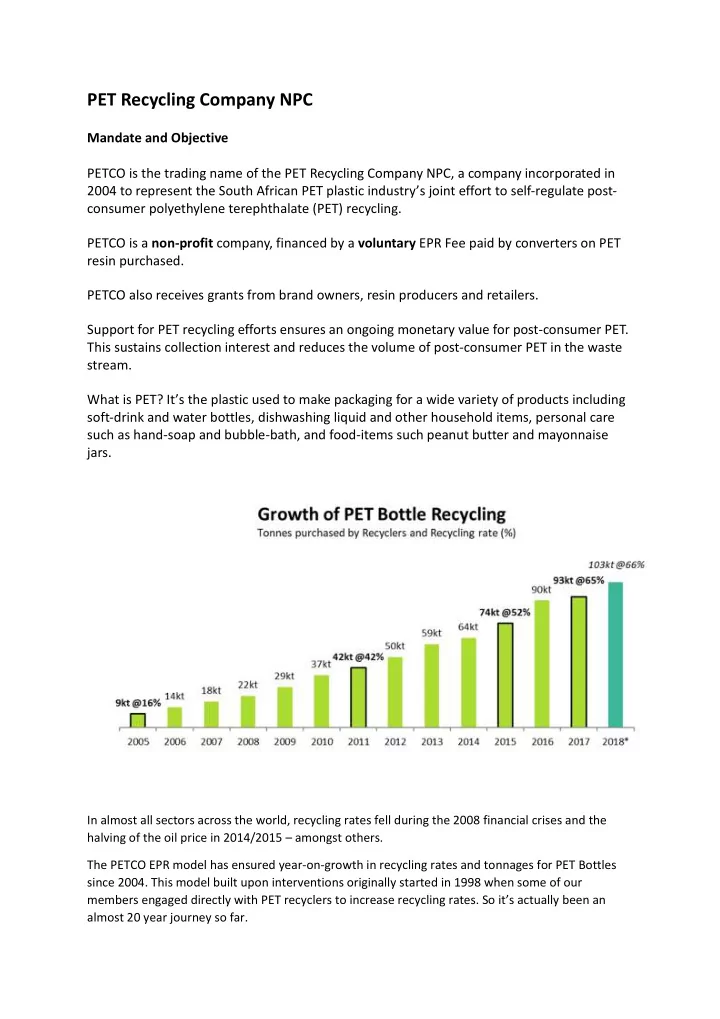

PET Recycling Company NPC Mandate and Objective PETCO is the trading name of the PET Recycling Company NPC, a company incorporated in 2004 to represent the South African PET plastic industry’s joint effort to self-regulate post- consumer polyethylene terephthalate (PET) recycling. PETCO is a non-profit company, financed by a voluntary EPR Fee paid by converters on PET resin purchased. PETCO also receives grants from brand owners, resin producers and retailers. Support for PET recycling efforts ensures an ongoing monetary value for post-consumer PET. This sustains collection interest and reduces the volume of post-consumer PET in the waste stream. What is PET? It’s the plastic used to make packaging for a wide variety of products including soft-drink and water bottles, dishwashing liquid and other household items, personal care such as hand-soap and bubble-bath, and food-items such peanut butter and mayonnaise jars. In almost all sectors across the world, recycling rates fell during the 2008 financial crises and the halving of the oil price in 2014/2015 – amongst others. The PETCO EPR model has ensured year-on-growth in recycling rates and tonnages for PET Bottles since 2004. This model built upon interventions originally started in 1998 when some of our members engaged directly with PET recyclers to increase recycling rates. So it’s actually been an almost 20 year journey so far.
In 2017, we achieved a 65% recycling rate for PET bottles, which translates to just under 94 000 tonnes or 2.15 billion bottles. We have an ambitious target to reach a 70% recycling by 2022, which will require a doubling of the PET recycling market, which we will continue to drive and support. Supporting Recycling PETCO’s key strategy has been to support the recyclers of PET bottles i.e. the re -processors of bottles. By ensuring that recyclers weather the volatile commodity markets, they are able to consistently buy bottles – providing a stable market for collectors to sell into. This allows for targets to be set, for businesses to be established and to grow. In tandem with this, we support the collection market to grow by supplying equipment and training. We aim to achieve a matched growth in both the supply and demand side of the recycling value chain – this is how sustainable market growth has been achieved. PET Bottle Collections by End Use Market We have found that the Development and maintenance of a growing viable end-use market for collected material has been crucial to a sustainable recycling model.
You can see from this bar graph, that polyester staple fibre (the blue section) made up the majority share of the end use for our collected material for many years. (There is ten years not displayed on this graph) We have recently seen a new entrant to the fiber production business from recycled bottles. PETCO has therefore ramped up its assistance for exporting locally produced fiber, to not only protect the local fiber market from over supply, but also to earn valuable foreign currency for the country. In 2017, approximately 50 000 tonnes of recycled PET, or close to 54% of the total PET volume collected, was recycled to make various types of solid and Hollow staple fiber. This processed fiber was then used in spinning, weaving and stuffing fibre filled pillows, garments, sofas and many more. Going forward, PETCO will continue to support the fibre sector in line with the South African government’s objectives related to local value addition, export promotion and foreign currency earnings. The bottle to bottle sector is receiving commitment from brand owners and debottlenecking in recycling facilities has seen THIS end use market becoming the dominant player. The recycling industry has further kept the cost of recycled PET material competitive despite the low oil price and fierce competition between recyclers for collected bottles in South Africa. More than 34 000 tonne of the PET bottles collected were recycled into the production of bottle to food and bottle to bottle grade PET resin in 2017. We have exported food grade recycled PET resin. These exports, earn even more foreign currency and reduce local resin supply pressures. We hope to see this trend continue in 2018 and beyond. The production and use of bottle to food and bottle to bottle grade recycled PET resin remains for now the major growth opportunity for PET recycling in South Africa. Exports of post-consumer collected PET bottles and processed flakes from South Africa remain at under 10% of our industry total. We are making every effort to do local beneficiation of our collected material rather than exporting baled bottles. This way we can continue to protect our industry ag ainst international market forces that so easily destroys a country’s collection efforts due to international oversupply of bottles. Partnerships: The African Marine Waste Network The African Marine Waste Network (AMWN) was launched July 2016 for the 38 coastal and island states of Africa: It is the first Network of its kind to focus on preventing marine pollution in Africa. The Network will provide an active platform for collaboration, resource and knowledge sharing within countries and across borders in Africa, and to find solutions to Afri ca’s marine waste problem that cater to African circumstances and cultures. This is an African contribution to solving a global crisis. The Network is multidisciplinary and open to all those involved in marine and pollution contexts, be it NGO’s, academic s and researchers, students, educators, centres of learning, governments and policy-makers, and members of industry and tourism. The Network aligns with the ethos of the United Nations Environment and Sustainable Development Goal 14, the Global Ocean Commission and the Global Partnership on Marine Litter. The inaugural African Marine Waste Conference 2017 was the first meeting point for the Network,
where delegates defined the future direction of the Network as well as collaborated on developing the “ Marine Waste Strategy: Guide to Action for Africa ”, a strategy plan for tackling and alleviating Africa’s waste problems.
Recommend
More recommend